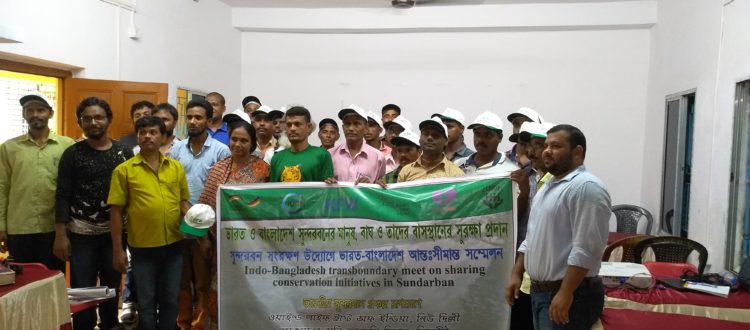Learning and Sharing for Tigers of the Sundarban Delta: A Transboundary Initiative
West Bengal, 20th June 2019: A three-day programme was organised in the Sundarban of West Bengal, by Wildlife Trust of India (WTI) and its partners in West Bengal and Bangladesh, the Lokmata Rani Rashmoni Mission and WildTeam, respectively.
Under the programme, six personnel working with WildTeam Bangladesh visited the Indian part of Sundarban, as an initiative under a joint project being implemented by WTI and WildTeam, with support from International Union for Conservation of Nature (IUCN) and KFW, through its Integrated Tiger Habitat Conservation Programme. “This transboundary meet intended to ensure that success stories and failures in various efforts to conserve tigers in the Sundarban landscape were shared across various stakeholders of tiger conservation, especially local people,” said Mr Krishnendu Basak, who is in charge of the transboundary project’s execution.
The six people visiting from Bangladesh were senior community trainers Md. Abu Zafar, Md. Isma Azam, Md. Saiful Islam, and Md.i Alam Howladar of WildTeam, as well as Village Tiger Response Team members Md. Sirajul Islam and Mrs Karuna Rani Sardar.
[acx_slideshow name=”sundarban”]
Village Tiger Response Teams (VTRT) established by WildTeam in the Bangladesh Sundarbans have since 2007 worked towards mitigation of human-tiger conflicts through community-led interventions, which includes driving back tigers that foray into villages and imparting education to villagers. Mrs Karuna Irani Sardar is also a “Banga Bondhu” awardee – the highest national recognition in Bangladesh – for her work also as a “Bagh Bondhu (Friend of the tiger)”, through which she has helped numerous villagers in Bangladesh Sundarban convert to non-forest dependent livelihoods.
During the course of the visit, the team from Bangladesh interacted with the thirty-five of the newly constituted Primary Response Team (PRT) members from Indian Sundarban, who are also being trained to support the forest department in human-tiger conflict mitigation as well as in other activities for tiger conservation in the landscape. They spoke to the PRT members about how WildTeam formed the VTRTs, and how these teams should function, the capacity they must possess and the returns they receive for their work. They also explained the role of other bodies such as Forest Tiger Response Teams (FTRT) and Community Patrol Groups (CPG) that have been constituted by WildTeam in Bangladesh for various purposes towards mitigation of adverse impacts of human-tiger conflicts.
The team also interacted with over fifty Indian beneficiaries (mostly women) of Alternative “non-forest dependent” livelihoods, where they provided their inputs on how such livelihoods could be enhanced to ensure a sustained income generation. Ms Sardar was particularly keen on explaining to the beneficiaries, most of whom were women, that such livelihoods are crucial to ensure their families’ long-term wellbeing. She narrated through her anecdotes how she had pulled herself out of dependence on forest resources and poverty, with hard work, and today was awarded the country’s highest national award for her work.
“Such interactions are crucial for people in the Indian Sundarban to get a clear understanding of how their Bangladeshi counterparts have begun proactively working towards tiger conservation as well as their wellbeing, and thus cater greater support to similar initiatives on the Indian side” said Dr. Mayukh Chatterjee, Head of Human-Wildlife conflict mitigation Division, WTI. He also added that this was first of a series of exchange visits planned across the countries.









